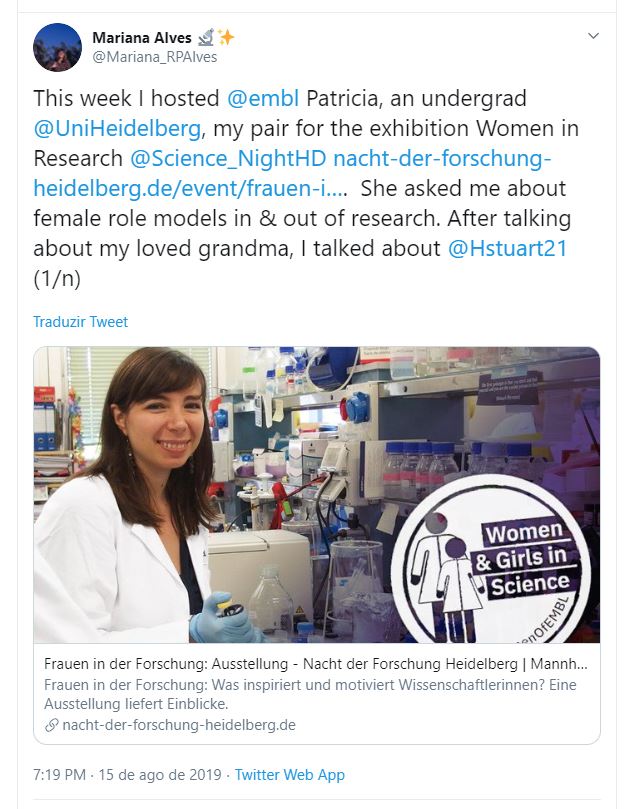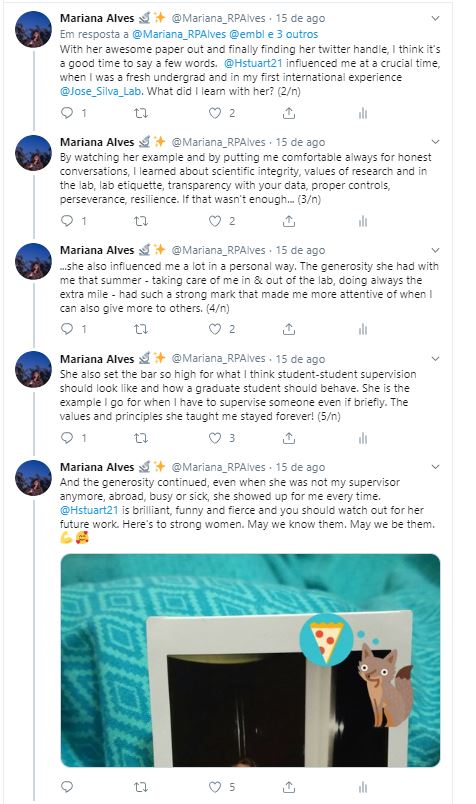How to use Twitter at a scientific event

Mariana R. P. Alves, 3rd year PhD Student in the Crocker Lab, Developmental Biology, EMBL Twitter @Mariana_RPAlves
When I was a 19-year old biochemistry undergrad, I had heard of Twitter but it was Facebook and Instagram that dominated my social media usage at the time. When I attended my first international conference, the Lindau Nobel Laureate Meeting in 2014, I noticed everyone was using Twitter and – not wanting to be left out- I created my account. Never would I have imagined that 5 years later it would be the only social media account I still have active, and that I would use it so much for work. This article is about my personal experience on the benefits of being active on Twitter, particularly during scientific events, as well as some tips on how best to use Twitter to your (scientific) advantage!
Spread the knowledge
Sharing is caring! And scientists should share. Being at a conference is truly a privilege for scientific exchange. Some scientists might not be able to attend the event you are in because of personal commitments, lack of funding, or even to reduce their carbon footprint. I’m sure almost everyone has taken notes of talks to share with their lab colleagues – now you can share what you learn with a bigger scientific community! If you share the highlights of the event you are attending, you are making the new exciting information available to those who would otherwise not have access to it. Isn’t this a good enough reason to start your Twitter account?
Minimise missed opportunities
Conferences can be overwhelming and you want to maximise your networking and scientific exchange. If you tweet about the scientific event and use its hashtag, other people in the conference can find you and you might find people with common interests that you wouldn’t have bumped into in the crowd. It was on Twitter also that I found people inside and outside my institute who wrote interesting things – you can always DM them for a coffee, and you might find a new friend!
Exposure
This is again about networking. Not only do you minimise the missed matches you could have with scientific minds at an event, but you also maximise your exposure and that can bring you unexpected opportunities. Opportunities could be someone advertising a job directly to you, a journal editor becoming interested in your paper, or someone from the press at that event wanting to feature you.
Fun
It can be super fun to act as a reporter of a conference. In 2018, the Social Media Manager of the time at EMBL gave me the challenge of taking over EMBL’s official Twitter account to post about the Lindau Nobel Laureate Meeting. It was a wild ride, I was super scared at the beginning but it was a lot of fun, and definitely fulfilled the 3 previous benefits I wrote. It also caught the eye of the conference organisers, who thought it was really cool of EMBL to do this.
-> Check out the social media report from my Lindau EMBL Twitter Takeover!
Win prizes
If the sensible reasons above are not enough to convince you, maybe you will be interested to know that some scientific conferences and courses have competitions over Twitter where you can win prizes. I once won a brand-new multi-dispenser pipette in a CamBioScience Course in Cambridge, because I had the most likes on my Twitter posts. Moreover, I did not even have that many likes, but there was not much competition around. Now I am very proud of my pipette and brought it with me from the UK to Germany. With EMBL Events, you can also win prizes – see more in the how-to bullet points below.
10 Tips on how to use Twitter
These are just some tips I have written down from the top of my head, but you can find a lot of useful info online, and on Twitter itself. In addition, several institutes have guidelines on their intranets about how to use social media for work. Finally, get advice from your institute’s Social Media Manager or Communications Department – they are the experts!
- Check the hashtag and handle of the scientific event you are attending and use it to check other people’s posts and always include it in your tweets.
- Follow the scientists and institutes you are interested in and admire.
- Don’t know what to tweet about? You can start by the highlights of your favourite talks.
- Make sure you follow a diverse group of tweeters, this way your timeline will definitely be richer.
- You do not need to tweet just about data and new scientific findings, you can share interesting anecdotes from the conference, highlight some conference features that should be replicated such as accessibility logistics, diversity or environmentally friendly upgrades.
- Debates and discussions are also very good content for live-tweeting.
- You can group several tweets about the same subject in what is called a “thread”. You just need to make your first tweet and write the others as comments below it. Frequently people indicate how many tweets will be in the thread by adding something like “1/5” at the end of the tweet.


- If your institute is open to it, you can propose to them that you take over their Twitter account for that conference – it could be a very interesting experience for all!
- Do not start a tweet with a handle because it will not show on your timeline. You can add a dot before it. For example, instead of “@emblevents I had an amazing time” you can write “. @emblevents…”.
- Have you attended an @emblevents conference or course? Don’t forget to post a picture of the EMBL or EMBO bag in any location around the world using the hashtag #EMBLbag and @emblevents to enter the competition
Furthermore, Twitter can be a great tool to find new papers, share your new paper, ask questions (it would be interesting to compare the effectiveness of asking on Twitter vs ResearchGate), learn about other conferences and about scientific community topics – from struggles to healthy changes (great hashtag for that is #eLifeAmbassador) – support other scientists, find job ads, and more…
So, what are you waiting for?!